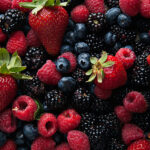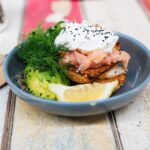PERSPECTIVES: Dr ALAN BARCLAY
FOOD AND MOOD
Most of us are aware that certain foods and drinks, like chocolate, or a nice hot cuppa, can provide comfort when feeling down, but many would be surprised to learn that there is increasing evidence that the types of foods and drinks we consume on a regular basis can have a more prolonged effect on our mood and brain function.

Why? There are many possible reasons, relating to both the structure and function of our brains and nervous systems:
Fats on the brain
Did you know that the human brain and nervous system is around 60 % fat? A large proportion of the nerves that comprise the brain and nervous system are surrounded by an insulating substance known as myelin that dramatically increases the rate at which nerve impulses are sent throughout the body. Myelin itself is about 80% fat, and most of the fat is of the poly-unsaturated kind, in particular, omega-3.
Long-chain varieties of omega-3 fat from seafood (e.g., herring, mackerel, sardine, salmon and tuna) are the best for our brains and nervous system. Shorter-chain varieties like those found in certain nuts and seeds (flaxseed, canola, walnut, wheat germ and soybean oils), and margarines and oils derived from these, can be converted to the long-chain varieties by our body – though not very efficiently.
Unfortunately, most people do not eat enough essential omega-3 fat these days. Aim to eat oily fish at least 2-3 times a week and small amounts of nuts, seeds and their oils each day. If you don’t like eating seafood, consider taking a fish oil supplement.
Brain function
Fuel up with smart carbs
Glucose is the preferred fuel for our brain and nervous system, with the typical adult requiring around 110-130 grams a day for optimal mental functioning. About 1/3rd of the glucose is used for brain fuel, and the rest is used for the production of amino acids, neuropeptides, and fats which in turn are used to produce essential neurotransmitters and hormones. The brain has limited ability to store glucose, and therefore optimal brain functioning is dependent upon a continuous supply. Therefore, it should come as no surprise that consuming the right type and amount of carbohydrate throughout the day is essential for everyone interested in optimal mental health and performance.
The amount of carbohydrate you need depends on many factors such as your age, gender, physical activity level, ethnic background, type of diabetes (if you have it), and medication use (if any). Needless to say that the optimal amount for you is best worked out in conjunction with your Accredited/Registered Dietitian, and other members of your health-care/performance team. As far as the type of carbohydrate is concerned, there is growing evidence that a healthy low glycemic index (GI) diet can improve mental performance, memory and mood. The average GI of most people’s diet is higher than recommended (ideally, the daily average should be less than 45). Therefore, aim to eat at least one serve of low GI carbohydrate with each meal and snack (if you have them), to help reduce your diets average GI.
Increase serotonin – the “feel-good” neurotransmitter
The “feel-good” brain chemical serotonin is manufactured in the body from the essential amino acid tryptophan, along with essential nutrients like vitamin B6, vitamin C, folate and zinc. Tryptophan is often found to be low in people suffering from depression, and several of the drugs commonly used to treat depression work by increasing brain serotonin levels. Luckily, it is commonly found in high protein foods such as eggs, meat (in particular Turkey and chicken) and beans (legumes). Interestingly, high carbohydrate foods, even though they may not contain any tryptophan, actually increase its availability, because the insulin released when carbohydrates are digested puts other competing amino acids to a different use, easing tryptophan’s entry into our brains.
Do food additives affect moods?
A popular urban myth is that red cordial makes some children go “ballistic” or hyperactive (often incorrectly described as going “hypo” by some people). While food additives are rarely the cause of hyperactivity in most children, it is worth pointing out that some people (children and adults) may have abnormal reactions to natural and added chemicals in foods. For example, foods high in amines like chocolate, tasty cheese, and many strong seasonings have a negative effect on some people. Others may be sensitive to preservatives (e.g., benzoates (food additive numbers 210-218), gallates (food additive numbers 310-312) and other fat preservers (food additive numbers 319-321)), colours (e.g., Tartrazine (102) Erythrosine (127), and Brilliant Blue (133)) and flavour enhancers (e.g., glutamates (food additive numbers 620-625)). If you suspect you may be sensitive to natural or added food chemicals, discuss it with your doctor, and perhaps arrange a visit to an Accredited/Registered Dietitian with experience in elimination diets.
Don’t lose your balance
While I have talked about specific nutrients and foods that may improve our mood, it is important that these are consumed as part of a healthy diet that is in line with current Dietary Guidelines.
Also, it is important to note that the evidence so far does not show that depression or other mental conditions can be prevented or “cured” by diet alone. But a healthy diet may help relieve the symptoms of certain mental illnesses; improve the effectiveness of medication for some of these conditions; and reduce the unpleasant side-effects of some of the medications used to treat these conditions. Of course, see your doctor and Accredited/Registered Dietitian for further advice.
Read more:
- Sugar for the brain: the role of glucose in physiological and pathological brain function
- Subjective Mood and Energy Levels of Healthy Weight and Overweight/Obese Healthy Adults on High-and Low-Glycemic Load Experimental Diets
- The effect of using isomaltulose (PalatinoseTM) to modulate the glycaemic properties of breakfast on the cognitive performance of children

Alan Barclay, PhD is a consultant dietitian and chef (Cert III). He worked for Diabetes Australia (NSW) from 1998–2014 . He is author/co-author of more than 30 scientific publications, and author/co-author of The good Carbs Cookbook (Murdoch Books), Reversing Diabetes (Murdoch Books), The Low GI Diet: Managing Type 2 Diabetes (Hachette Australia) and The Ultimate Guide to Sugars and Sweeteners (The Experiment, New York).
Contact: You can follow him on Twitter, LinkedIn or check out his website.







